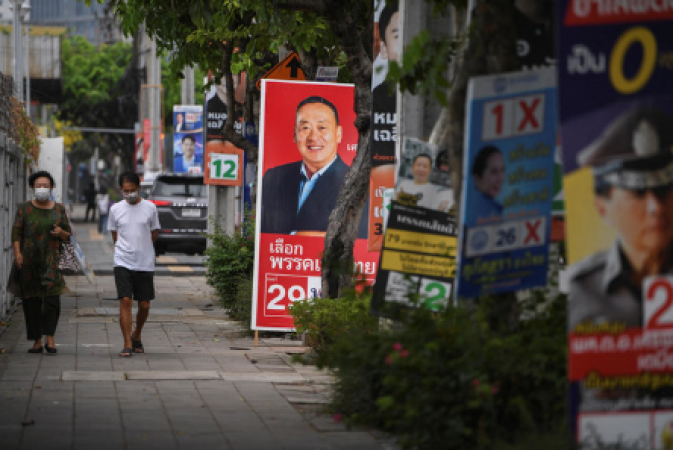
Sa Kaeo: Preeya Phunatung works long hours in the sweltering heat on a construction site in a rural area of Thailand to support her family of four.
Preeya finds it difficult to purchase even necessities like rice, fish sauce, and cooking oil because her $9 per day income is not keeping up with inflation.
On May 14, Thailand will hold elections, and the country's major parties have pledged to reduce poverty as low-income households struggle to survive in the face of rising costs and systemic inequality.
Analysts caution, however, that the populist policies currently being discussed won't do much to address structural issues that have caused Thailand's economic growth to lag behind that of its Southeast Asian neighbours.
Also Read: Fatalistic Moscowers ignore the alleged drone attack on the Kremlin
Preeya said, "I live from hand to mouth," at her small home in the eastern province of Sa Kaeo, where official data show that the number of people living below the poverty line increased by almost 25% between 2020 and 2021.
"Life is very difficult after the pandemic."
According to Forbes magazine, Thailand is home to nearly 30 billionaires, but it also has one of the highest rates of income inequality in East Asia and the Pacific.
After the military coup in 2014 that installed the current prime minister, Prayut Chan-O-Cha, momentum towards eradicating poverty that had been building since the 1990s was lost.
The stagnation was made worse by the Covid-19 pandemic, and the kingdom has had trouble recovering.
According to the World Bank, Thailand is the only country in Southeast Asia with a GDP that has not yet reached pre-pandemic levels, aside from coup-stricken Myanmar.
Parties from all political perspectives are engaged in a bidding war to win over the nation's millions of low-income voters as the election campaign enters its final stretch by promising higher wages, pension increases, and debt relief. To boost the economy, the main opposition Pheu Thai party has pledged to give every Thai adult a $300 gift.
Also Read: Ukraine claims to have seized the exiled billionaire's assets worth $280 million
One of Pheu Thai's candidates for prime minister and a wealthy former real estate magnate named Srettha Thavisin maintains that the $16 billion policy can be funded without raising taxes.
The ultra-wealthy Shinawatra family, whose patriarch Thaksin won two elections on a broad platform of populist economic promises, is associated with Pheu Thai, which is currently leading the polls.
In addition, the party wants to raise the minimum daily wage from $10 to $17 by 2027. Move Forward, the second-largest opposition party, has pledged to immediately raise the minimum wage to $13, with subsequent increases based on inflation each year.
Despite the fact that his party has promised to triple the value of the social welfare cards he introduced in, the embattled incumbent Prayut has warned voters not to believe in populist promises.
On a campaign stop in Bangkok, the former army chief declared, "We have already suffered enough from the unfavourable effects of election campaigns full of promises.
However, many blame Prayut for the economic downturn. The leader of the Move Forward party and auto parts magnate Thanathorn Juangroongruangkit claimed that the military-backed government had not done enough to support the growth of small businesses.
Long-established family conglomerates with strong connections to the political system have dominated Thailand's economy. "Monopolies need to be eliminated. At a recent rally in Bangkok, Thanathorn stressed the need for a more open market society and the significance of market competition.
According to Pasuk Phongpaichit, an economics professor at Bangkok's Chulalongkorn University, inequality has been a recurrent issue in Thai politics ever since Thaksin rose to prominence following the Asian financial crisis more than 20 years ago.
According to Kiatipong Ariyapruchya, senior country economist for Thailand at the World Bank, the economy now requires spending on those in need and improved education in order to increase earning potential.
There are many structural barriers in the nation, he said, that if they were removed, people would be able to find better jobs and earn more money. As well as helping the services sector become more competitive, education is crucial.
Also Read: Volodymyr Zelensky declaring that he is confident Vladimir Putin will be found guilty of war crimes
Additionally, some voters are attracted to sustainable economic development after years of flashy promises. 52-year-old Srima Sripibal works as a security guard in an upscale area of Bangkok and makes $13 per day. He wants long-term solutions because he struggles to pay for his grandchildren's education and borrows cash to get by each month. We spend any money that is given to us, and then it is gone, he said. "A good job is more long-lasting.